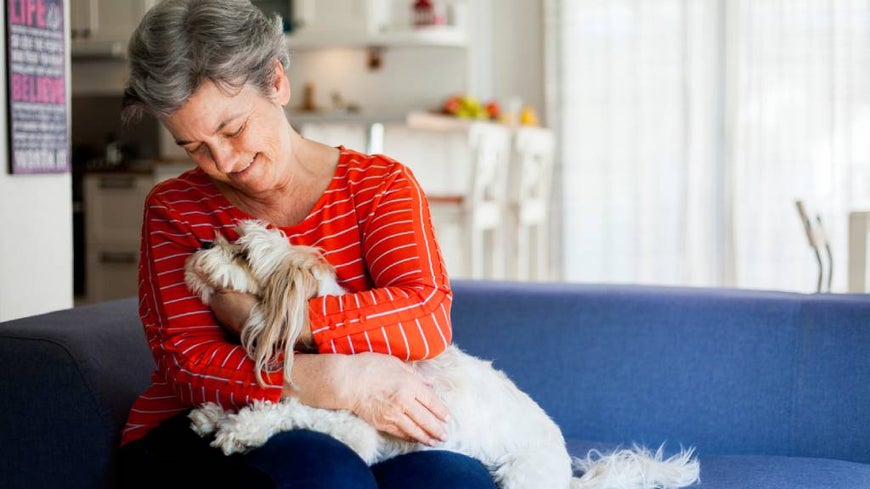Thinking of getting a dog? How to choose the right breed

Written by Monique Butterworth for Australian Seniors.
Spending time with four-legged friends can do wonders for your health and wellbeing. Patting a dog helps lower blood pressure, walking your pet ensures you get exercise, and you can increase your social circle by bonding with other owners on walks or in dog parks.
But the decision to become a dog owner requires taking an honest look at your lifestyle and health to ensure you can meet all your new companion’s needs. Researching the right breed is also critical, as is considering age, says veterinarian Dr Ari Ende, from Sydney’s VETaround.
“The age of the dog is very important. If you’re looking at getting a puppy, they need a lot more supervision, they make a mess and require training,” he explains.
But adult dogs come with challenges, too. “It is harder to come across an adult dog that isn’t a rescue,” says Dr Ende. “It is common for rescues to come with baggage such as anxiety and mental health disorders, allergies, and skin disorders. You’ve got to be prepared to take on a dog that may need a lot of commitment.” Remember, if you are considering buying a puppy, there are ethical factors to consider, especially with the rise of the ‘pandemic puppy’ craze.
Find the breed that ticks your boxes
Dr Ende says his all-round best breed is the golden retriever, which ticks all the boxes – it is suited to apartment living, keeps you active, is good with grandkids and security, and is low-allergenic.
“It is a large dog breed but if you’re active and get out and about with your dog, the golden retriever will be perfectly fine living in a more confined living space such as an apartment or townhouse.”
While the adorable cavoodle (a Cavalier King Charles spaniel/poodle mix) topped the list of Australia’s most popular dogs in 2020, there are plenty of other types to choose from, depending on your lifestyle. These are Dr Ende’s recommended breeds:
Apartment or townhouse living

Small breed – Cavalier King Charles spaniel
These little spaniels are affectionate, adaptable, and happy to snuggle on their owner’s lap, but be prepared to do some grooming.
Large breed – Greyhound (pictured)
This increasingly popular rescue dog might surprise you in terms of small space compatibility. You need to get them out for a walk, but they are quite lazy and will happily take over your couch. They are very happy hanging out with their humans and are a beautiful dog. Read about how a rescued greyhound was adopted into a loving forever home.
Keeping you active

Small breed – Maltese terrier
This quintessential lapdog is also a little breed with lots of energy. Maltese terriers benefit from a couple of short, easy walks a day, and do need regular trips to the groomer.
Large breed – Golden retriever (pictured)
Friendly, playful, and docile, they get along with other pets, are smart, outgoing, and make wonderful companions.
A breed for security

Small breed – Jack Russell terrier
Smart and very loyal, these dogs can also become overprotective and show aggression to strangers or other family members, which needs to be kept in check. An energetic breed that requires a lot of exercise.
Larg(er) breed – Beagle (pictured)
Smart and very active, beagles need to be trained, otherwise they can be difficult to live with. They also need a secure yard as they can be escape artists, but they are always on patrol to bark at intruders.
Tolerant of grandkids

Any dog is capable of aggression, so never leave any breed unsupervised around children.
Small breed – French bulldog (pictured)
Good with kids, they are energetic but lack endurance, so a moderate, daily walk is enough exercise. Grooming is minimal but Frenchies can be prone to breathing problems and skin issues.
Large breed – Bernese mountain dog
Affectionate and good-natured, these big, strong dogs are eager to please. With a double coat, there will be shedding, so daily brushing is essential.
Best breeds for allergies

There is no true non-allergenic breed of dog, but some breeds are considered less allergenic than others.
Small breed – Bichon Frisé (pictured)
They need to be groomed occasionally, but these dogs are otherwise reasonably low maintenance. Affectionate and excellent companions.
Large breed – Standard poodle
One of the smartest dog breeds, they’re loyal, affectionate and require daily walks and professional grooming every other month. Smaller sized miniature poodles are also recommended.
18 Nov 2021